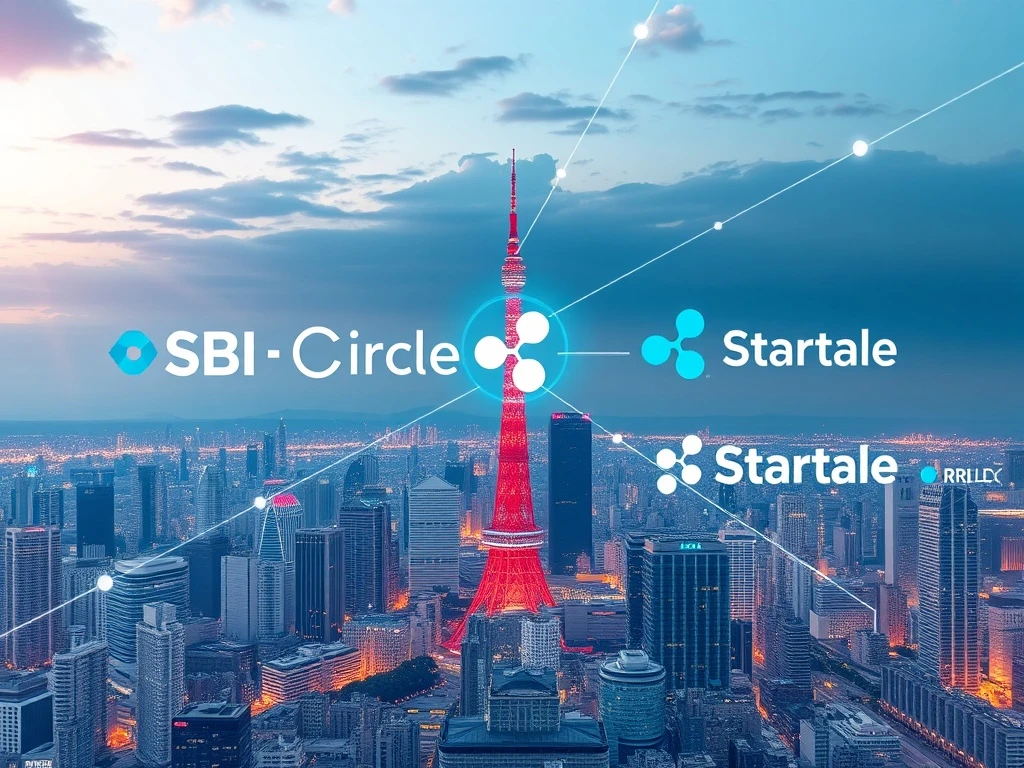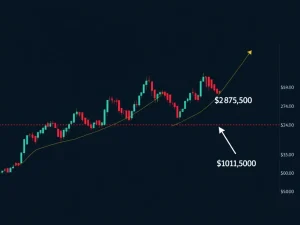SBI Blockchain Partnerships: Japan Pioneers a Transformative Digital Finance Era

Japan’s financial landscape is undergoing a significant transformation. SBI blockchain partnerships are at the forefront of this change. The conglomerate recently unveiled strategic alliances. These ties involve global crypto giants Circle and Ripple. They also include Web3 innovator Startale. This move positions Japan as a leader. It embraces the future of digital finance.
SBI’s Strategic Leap into Digital Finance
SBI Holdings, a prominent Japanese financial group, is making bold moves. They are expanding their footprint in the blockchain space. The company announced three distinct collaborations on Friday. These partnerships aim to revolutionize digital finance. Specifically, they target stablecoins and tokenized assets. These initiatives highlight SBI’s commitment. They embrace innovation within the Web3 ecosystem. Consequently, the strategic SBI blockchain partnerships will reshape Japan’s crypto landscape. Helen Partz reported this news four minutes ago, highlighting SBI’s proactive approach.
The collaborations extend SBI’s influence. They cover various aspects of the digital economy. These include enhancing stablecoin utility. They also involve developing advanced tokenization platforms. SBI’s long-standing history in finance provides a strong foundation. Its embrace of emerging technologies further solidifies its market position. This comprehensive strategy underscores a vision for a more integrated financial future.
Driving Japan Stablecoin Adoption
A key focus of these new alliances is stablecoin adoption. SBI is partnering with Circle. Circle is the issuer of USDC. They will explore new use cases for this widely used stablecoin. A joint venture aims to boost USDC utilization in Japan. This initiative seeks to foster growth in Web3 and digital finance domains. Furthermore, SBI is collaborating with Ripple. This partnership focuses on the distribution of Ripple USD (RLUSD). SBI VC Trade, SBI’s crypto subsidiary, will lead this effort.
They plan to make RLUSD available by March 2026. Tomohiko Kondo, SBI VC Trade CEO, emphasized its importance. He stated RLUSD will enhance reliability and convenience. This marks a major step for the Japan stablecoin market. The combined efforts of Circle Ripple SBI are set to expand stablecoin options. SBI had previously announced similar partnerships. SBI VC Trade completed registration to support USDC operations in March. This shows a consistent strategic direction for the conglomerate.
The establishment of a joint venture with Circle is significant. It aims to promote USDC use. It will also create new Web3 and digital finance use cases. Conversely, the Ripple partnership focuses on distribution. A memorandum of understanding (MOU) outlines this plan. SBI VC Trade will be central to making RLUSD accessible. This dual approach addresses different facets of stablecoin integration.
Pioneering RWA Tokenization Japan
Beyond stablecoins, SBI is deeply invested in asset tokenization. They formed a joint venture with Startale. This Singapore-based Web3 company is a key partner. Together, they will build an onchain trading platform. This platform will support tokenized stocks. It will also facilitate trading of other real-world assets (RWAs). This venture will enable 24/7 trading capabilities. It promises unprecedented liquidity and capital efficiency. Yoshitaka Kitao, SBI CEO, expressed his vision. He believes this convergence will accelerate. Traditional finance and DeFi will merge. This development signals a significant advancement for RWA tokenization Japan. It aims to digitalize capital markets.
The joint venture with Startale has secured committed funding. This funding is milestone-based. It will support the development of this innovative platform. Kitao further predicted a broader movement. He stated this trend would eventually lead to the digitalization of capital markets themselves. This includes exchanges. By capturing this trend, SBI aims to leverage its corporate ecosystem. They will combine it with Startale’s blockchain technology. They have great expectations for creating a new decentralized platform.
Startale is well-known for its expertise. It co-developed Sony’s layer-2 blockchain Soneium. It also contributed to Astar Network. While the technical architecture remains undisclosed, the mission is clear. Startale Group CEO Sota Watanabe highlighted this. The joint venture aims to deliver an always-on, compliant trading platform for tokenized assets. The timeline for this launch will be announced later.
Unlocking the Potential of Tokenized Assets
The creation of this new platform is a strategic move. It taps into a growing global trend. Companies worldwide are exploring tokenized assets. Firms like Gemini, Kraken, and Robinhood offer similar platforms. They provide 24/7 trading for tokenized stocks. Michael Saylor’s Strategy (MSTR) is one example. These initiatives underscore the increasing demand for digital representations of value. SBI’s platform will leverage Startale’s blockchain expertise. This brings robust technology to the venture.
Tokenized RWAs offer distinct advantages. They enable real-time settlement, 24/7. They also achieve unprecedented liquidity. Capital efficiency significantly improves. This convergence of traditional finance and DeFi is accelerating. The market for RWAs is expanding rapidly. Data from RWA.xyz shows consistent growth. This trend suggests a fundamental shift in asset management. SBI’s move aligns with this global momentum. It positions Japan as a key player in this evolving sector. Scaramucci’s plan to tokenize $300M in assets also reflects this surge. It nearly doubles Avalanche’s RWA base.
SBI’s Strategic Vision and Ecosystem Advantage
SBI’s proactive engagement underscores a broader industry shift. Major financial institutions globally are experimenting. They are tokenizing traditional assets. This movement is gaining considerable momentum. Eric Trump’s reported visit to Tokyo highlights this trend. His family’s expanding interest in crypto is notable. SBI’s comprehensive strategy positions them uniquely. They are at the forefront of this digital evolution. Their SBI blockchain partnerships with industry leaders are crucial. These collaborations promise to redefine financial services. They aim to make them more efficient, accessible, and transparent.
SBI has maintained a long-standing partnership with Ripple. This relationship facilitated various XRP (XRP) services. These services spanned across its platforms for several years. This existing infrastructure provides a strong foundation. It supports the new ventures. Leveraging its corporate ecosystem is key for SBI. This approach maximizes the impact of new blockchain technologies. The integration of these digital platforms into SBI’s existing financial services will create synergies. It will also foster broader adoption. This strategic foresight ensures SBI remains competitive.
Looking Ahead: Japan’s Digital Finance Future
These recent announcements mark a pivotal moment. SBI is cementing its role as a blockchain pioneer. Their strategic alliances with Circle, Ripple, and Startale are significant. They are paving the way for advanced digital financial services. This includes robust stablecoin ecosystems. It also encompasses innovative RWA trading platforms. Japan is clearly embracing the digital frontier. The nation’s regulatory environment continues to evolve. This supports such advancements. The future of finance in Japan looks increasingly digital. These partnerships promise a transformative impact.









